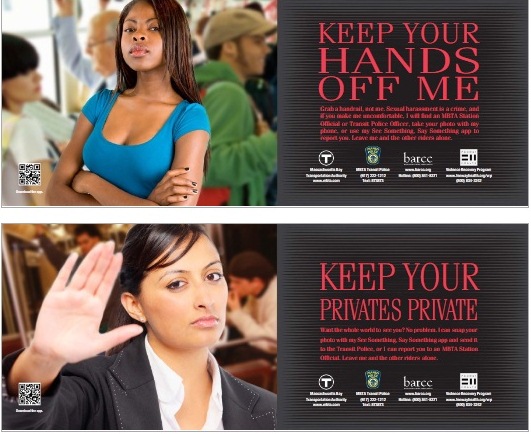Liz Merino, Massachusetts, USA, SSH Blog Correspondent

According to the Massachusetts Bay Transportation Authority’s 2014 Ridership and Service Statistics, more than one million riders use its urban services every week. This includes the Red and Orange Line, as well as the system’s many buses and trackless trolleys.
I am only one of those riders, and I am a woman. Taking public transit as a woman in the dog days of summer isn’t easy. Let me rephrase that, being a woman on public transit is never easy, but the summer makes it a hell of a lot worse.
“It makes me really uncomfortable how people feel so comfortable with just shouting degrading things to you or things like, ‘Hey, do you want a boyfriend?’ or ‘Where’s that smile?’ It really turns you off from riding public transportation, but with most people, that’s their only option getting to work or wherever they need to go,” said NYC resident Maddie Michalik
The bus stop that I wait at every day to take into the city is on a main stretch of road, busy with the typical morning rush hour found anywhere across the U.S.
I’m sure the harassment I face can be found there too.
Men slow down their cars and yell at me out their window as they pass by. Some I can’t understand, their words garbled by wind, others I find I’m able to tune it out, but then there are other things I hear but for now I won’t repeat.
Others just stare. I know what you’re thinking. What do I mean staring? How can someone staring be harassment, especially from across the street in a car, a bus, a truck a anything?
A stare may not seem like anything but for men that harass and see women as nothing but something to look at and f***, it is. Their eyes are lecherous, undressing me, a once over that lasts as long as a red light but feels like forever leaving me sweating but still wishing I was wearing a parka instead of a skirt and a top.
Fully dressed I seemingly feel completely exposed.
At the bus stop I have nowhere to go, and these men know it. As they continue to stare, I look away, put up my book, stare at the sun and wait for the sidewalk to swallow me whole. Or I did.
I’ve started to stare back. Sometimes I wave like I’m a woman in the circus, a one-lady show hard and fast until they look away. My personal favorite is giving the finger or looking away blatantly as if they are not even there. I told my friend this and she worried for my safety.
A man rebuffed for his advances, unwanted at that, is a scary thing. A man with a grudge and a sense of entitlement to a body that isn’t his, a woman’s worst fear. I stand in the same spot every day.
What if they come back for me?
“I want to be just like every other commuter, pedestrian and jogger in the park. Can women be anonymous, invisible sometimes? Is that too much to ask?” asked Boston resident Lisi when asked about her experience with harassment.
In some aspects, though, it is getting better. The street harassment dialogue, the stories, social media posts and personal accounts are getting louder. Now, they can’t be ignored.
The other day on the Orange Line a man sat in one of the seats reserved for those that are handicap, close to the door and easy accessible. It’s also a spot to see everyone who gets on and off the train.
Standing three seats over, I watched as he tried to talk to a woman with headphones in. She wasn’t interested and shook her head, so he reached out and tried to grab her. Before he made contact, she moved away and the jostle of her body alerted the other passengers, including myself, that something was amiss.
The doors opened and she got off, another woman taking her place. Again the man tried to talk to this new woman, and again she just wanted to ride to her destination and not be bothered, like everyone else. When she didn’t respond to him speaking, he reached out to touch her too, and before my mouth opened, the lips of another parted and what she said made the whole car turn.
“Hey, you don’t touch her, or me or anyone else. If you want something you use your mouth and if someone doesn’t want no part of it, you leave them be. But you respect their personal space, you hear?”
He sat and stared, and two stops later he was gone.
All it takes is one voice in a crowd of many to say what so few can sometimes manager to utter on their own. As a woman, it made me happy to see a fellow woman stick up for someone else, but it made me happier that the whole car was in agreement with what she had said.
It can be easy in situations like this to turn away, it’s uncomfortable and awkward, and sometimes to speak up, it can even be dangerous. But when nothing is said instead, the behavior seems to be accepted as normal. Street harassment, touching someone without consent, yelling and hollering, groping and staring, whistling and whispering isn’t normal.
Speaking up can be hard, but saying something makes a difference even if it’s small or seems insignificant. Saying something means it’s happening, and it’s wrong, but you see it and won’t let it continue. Using your voice, no matter how loud or soft, speaks volumes for those who at the moment cannot find their own.
Liz is a recent graduate of Hofstra University with a Bachelor of Arts Journalism degree. She is currently a staff writer for a marketing agency in Boston. Follow her on Twitter @slizmerino and Instagram @elizabethmerino93.
